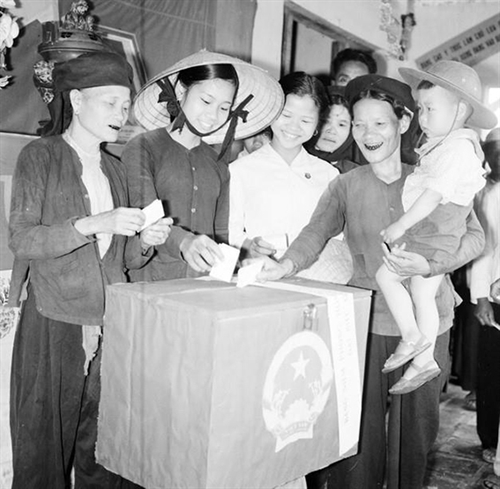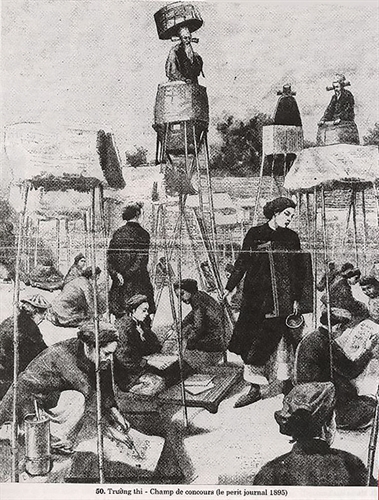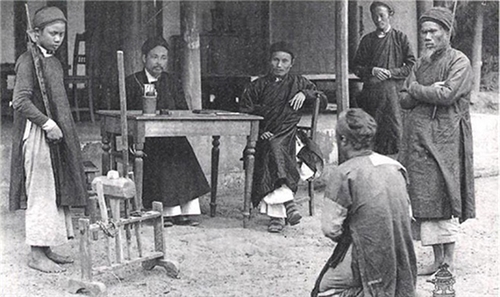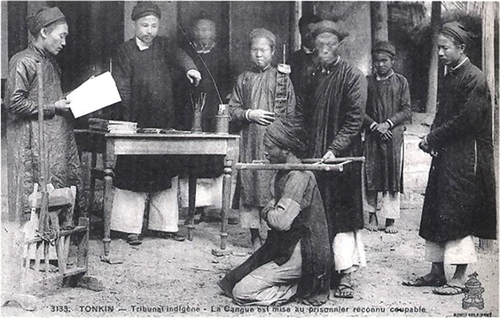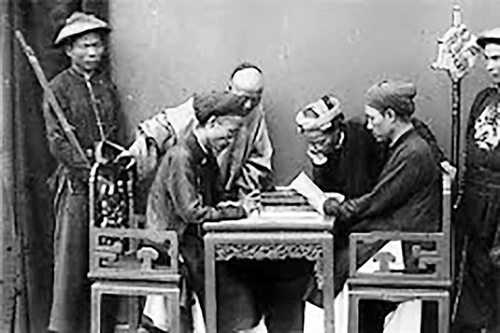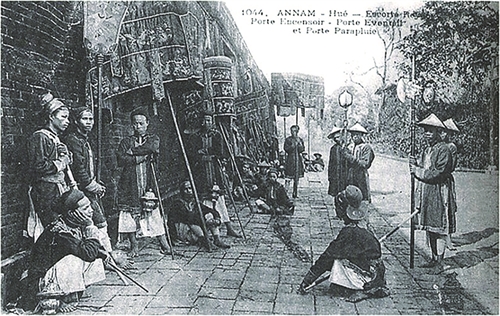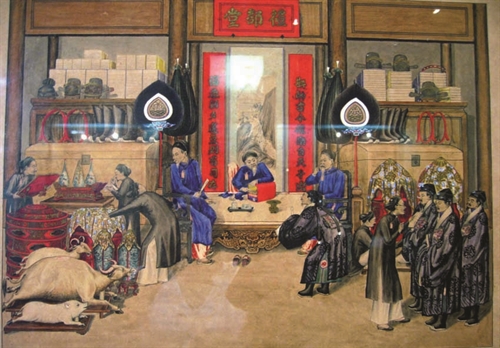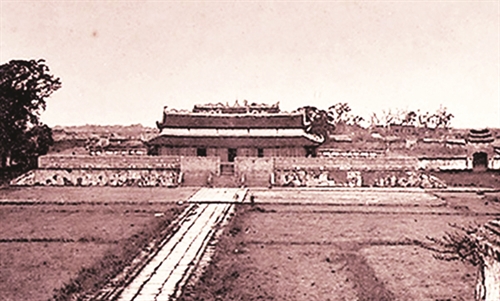Pham Thi Thu Hien, LL.D.
Hanoi Law University
During the feudal time, Vietnamese family relationships were governed by not only Confucian principles but also fundamental morals, which established a code of conduct among family members and affirmed the rules for family ties. Children were expected to show their filial piety towards parents and grandparents while brothers and sisters to show self-denial and altruism to one another. The harmonious combination of the fundamental morals and Confucian principles among family members has formed the traditional family culture of Vietnamese people. Vietnamese feudal laws institutionalized the traditional morality with specific duties for family members and measures against violations. The values and limitations of Vietnamese feudal laws in this regard have been inherited and abolished in the spirit of ensuring equality, freedom and human rights for women, the elderly and children - the disadvantaged members in families and society.
Rights and duties of family members under Vietnamese feudal laws
Relationship between parents and children
Under Confucianism, parents had to strive for self-improvement so as to well manage family affairs. This constituted their primary duty. Only when parents behaved well towards each other could they become a firm mainstay for a happy family. “Hong Duc Thien Chinh Thu” (Hong Duc Good Policy Book) quoted these instructions: “Parents should temper themselves to manage family affairs and build a harmonious and happy family”[1] and “parents must give their children food and clothing” (Article 36). “Parents must endure to educate children and would be blamed if they failed. If children commit rebellious acts, their fathers will be penalized; if children commit thieveries or burglaries, their fathers will be subject to rank demotion; if children pass examinations, their fathers will be rewarded with higher ranks” (Article 37).
For their part, children were obliged to show respect and filial piety towards their parents, take care of them when they get old, and must neither leave them in poverty nor force them to work hard[2]. The feudal laws treated undutiful acts as a crime. “Hoang Viet Luat Le” (Royal Laws and Regulations of Vietnam) defined: “the crime of being undutiful involves insulting grand-parents and parents; leaving disabled grandparents or parents to live lonely; getting married when mourning for a deceased parent; hiding or falsely declaring the death of a grandparent or parent” (Article 2). By defining undutiful acts, Vietnamese feudal laws spelt out specific obligations of children towards their parents. As parents gave birth and settled position to children, the latter were obliged “to respect and nurture their parents regardless of whoever they are, high-ranking court mandarins or commoners” and “not to show ungratefulness towards their parents for the reason of poverty”[3], according to Hong Duc Thien Chinh Thu. If the parents of a criminal offender were old and weak without anyone to rely on, the feudal laws permitted his bail in order to take care of their parents. Hoang Viet Luat Le stated in Article 17: “Offenders, who are sentenced to hard labor on exile but have old and weak parents without any family member to take care of, will be punished with 100 heavy stick strokes[4] instead, and allowed to bail out to take care of their parents”.
When their parents die, children were obliged to go into deep mourning and worship them. Hong Duc Thien Chinh Thu wrote in Article 4: “Children’s duties towards parents are very heavy; hence, married daughters will go into mourning for a deceased parent for one year. Moreover, weddings, births, festivities, wearing gold and silver jewels or gaudy clothes will be banned for three years. Those who breach these regulations will be charged with the crime of being undutiful”[5].
According to the Confucian principles, children’s bodies were created by parents; hence, when their parents were convicted, children could admit the faults committed by their parents. Quoc Trieu Hinh Law (The Criminal Law of Royal Court) provided in Article 38: “Children or grandchildren accepting the penalty of rod whippings or heavy-wood strokes for their convicted parents or grandparents will be served this penalty but one grade lighter”.
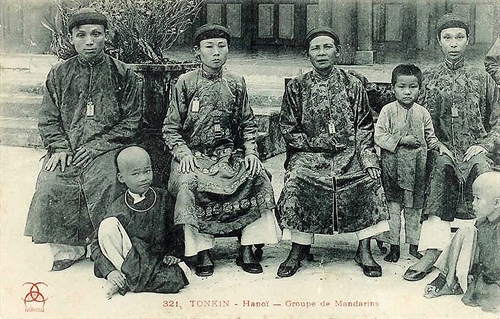 |
| Noble men in the Nguyen dynasty__Photo: Internet |
Husband-wife relationship
Vietnam’s feudal laws also codified the basic Confucian requirements for the conjugal ties in the family. A royal decree promulgated in early 1663 on mandarins’ ethics demanded “mutual love and mutual respect between husband and wife”[6] in order to create family harmony. However, the marriage and family regime in feudal Vietnam was characterized by patriarchy with authority over women being handed down from fathers to husbands[7], hence, the husbands always held the prominent role in the families. They were obliged to manage the families, “bowing their heads to take care of wives and children” (Article 160 of Hong Duc Thien Chinh Thu); and punishing wives when the latter committed mistakes.
Meanwhile, the wives had to abide by the three-follows principle (when unmarried, to follow the father; after getting married, to follow the husband; when the husband dies, to follow the children) and the ethical standards set by Confucianism, which were codified by Vietnamese feudal laws in such obligations as co-inhabitation, faithfulness, going into mourning… Those who breached these obligations would be severely punished. In his “24 Huan Dieu” (24 Instructions Oration), King Le Thanh Tong said: “Women are duty-bound to submit to their husbands, not to rely vaingloriously on their parents’ wealth to show overweening attitude towards their in-laws. Those who breach this, their own parents will also be penalized”. Or if wives denounce their husbands, they would be convicted of one of ten serious crimes. Article 321 of Quoc Trieu Hinh Luat provided: “Lawful wives or concubines who abandon their in-law families will be subject to hard labor or to 100 heavy-wood strokes under Article 108 of Hoang Viet Luat Le. Family harmony was regarded as the basis for establishing the social order and depended on the wives’ behaviors.
Fraternal ties
The feudal laws institutionalized the Confucian ethical rules to protect moral principles. Article 96 of “Hong Duc Thien Chinh Thu” stated: “Brothers must love and get on well with one another and not be instigated by their wives to harm their blood and flesh ties and defame the family”. King Le Thanh Tong’s “24 Huan Dieu” also said: “Brothers in a family should be mutual-affectionate and love one another, befriend neighbors, temper themselves with politeness and uprightness; if they act against the eldest brothers’ advice, they will be penalized with rod whippings or even reported to mandarins for adjudication”[8].
Different from Confucian rules, Vietnamese feudal laws only mentioned duties and behaviors, without specifying the attitudes of parents and children upon performance of their duties. This shows that the Confucian principles, when combined with Vietnamese morality, became more flexible. Besides, the institutionalization of moral criteria into the conducts of parents and children testified to the harmonious combination between morality and feudal laws of Vietnam.
Acts of law violation by family members
Vietnam’s feudal laws clearly defined the obligations of different family members: The parents were obliged to educate and bring up their children; children had to show their filial piety to and obey their parents’ words; wives were obliged to be faithful to and worship their husbands; husbands had the duty to take care of their wives and children; elder brothers and sisters had to protect their younger ones who, in turn, had to show respect to the former. Family members who acted against such regulations would be punished under law.
However, the feudal laws forbade excessive punishments by parents and grandparents. Quoc Trieu Hinh Luat provided in Article 475: “Parents or grandparents who beat to death their disobeyed children or grandchildren will be subject to “do lam khao dinh”[9], or “do lam tuong phuong binh”[10] if children were killed by sharp objects. If they deliberately kill the children, they will be subject to a penalty one level heavier”. However, if parents had done their best in educating the children but the latter still disobeyed and insulted their parents, the feudal laws allowed parents to renounce such children. According to Hong Duc Thien Chinh Thu of 1476, if children indulged in boozing, gambling or a depraved life, insulted their grandparents, parents or relatives, disobeyed the family education, declined to correct their wrongdoings, their parents can renounce them”[11].
If children committed serious crimes such as killing their parents, they would be subject to the penalty of carving the offender’s flesh until death[12] as their acts “harbor the wicked intentions of dishonest and cruel, wayward and impertinent persons”[13]. Feudal laws forbade children to denounce their parents and grandparents. Quoc Trieu Hinh Luat provided in Article 504: “Children who denounce their parents or grandparents will be exiled to remote regions” or Hoang Viet Luat Le stated in Article 306: “ Children who denounce their parents or grandparents, though truthfully, will be penalized with 100 wood strokes and three years of hard labor” or “wives who cause injuries or death to their husbands will be subject to remote exile or hanging; or deliberately murder their husbands will be beheaded.”
Quoc Trieu Hinh Luat also stated: “Children who decline to go into deep mourning when parents die will be subject to hard labor. Those who falsely declare the death of their grandparents, parents or husbands in order to ask for money or loans or to evade any obligation will be subject to three-grade demotion” (Article 543), or “younger brothers or sisters who insult, beat or wound their elder ones will be penalized with hard labor or exile” (Article 477).
Though Confucianism and feudal laws underscored the positions of fathers, husbands and elder brothers in the family, they more or less protected the interests of women who were entitled to own property and inheritances (Articles 374, 375 and 376 of Quoc Trieu Hinh Luat) or to request divorce (Article 108 of Quoc Trieu Hinh Luat and Article 97 of Hoang Viet Luat Le) or even reject the divorce request of their husbands.
It can be realized that the moral standards of family relations should be necessarily maintained as families constitute the cells of the society and an important factor for social stability. Therefore, to build a law-ruled state in line with the world development trend, the family should be taken as the center, and the positive values of feudal laws should be inherited to build the code of conduct of traditional Vietnamese families while building the model of modern families suitable to the trend of time, where the elderly, children and women will be protected and enjoy their lawful rights.-

